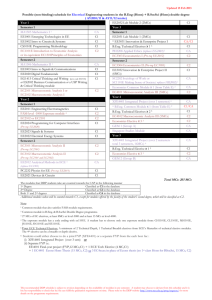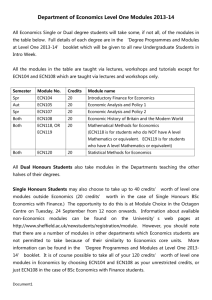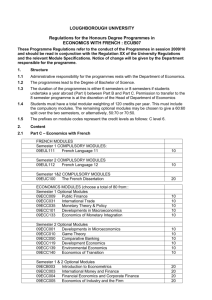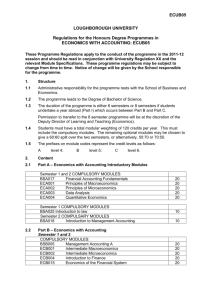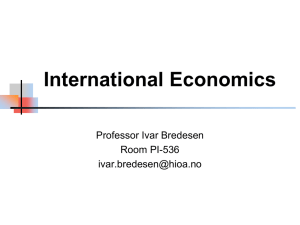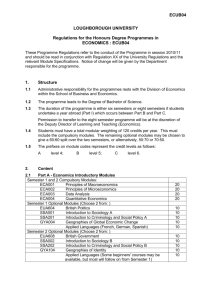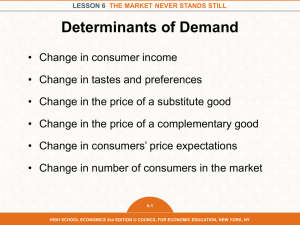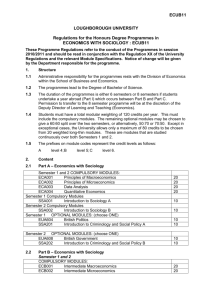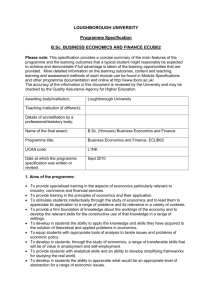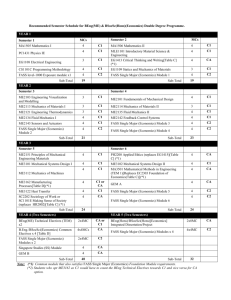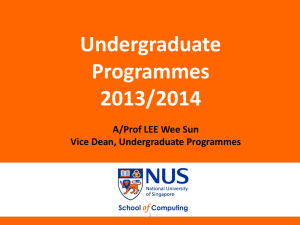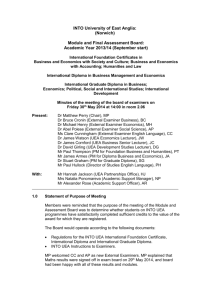Experience with DDP in Engineering and Economics
advertisement
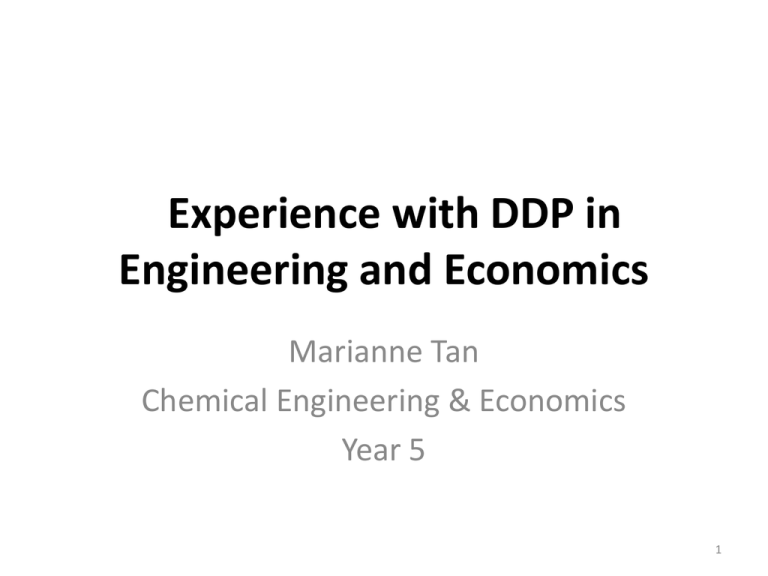
Experience with DDP in Engineering and Economics Marianne Tan Chemical Engineering & Economics Year 5 1 Overview • • • • • Modules Experience With Modules Potential Difficulties Integrated Honours Thesis Why Do The DDP 2 Economics Modules • Microeconomics – Consumer behaviour, Producer behaviour • Macroeconomics – Growth, Business cycles • Econometrics – Linear regressions for empirical study • Electives 3 Module Workload • DDP is designed to be completed in 5 years, averaging 20MC per semester • Engineering – 3 hr lectures, 1 hr tutorial • Economics – 2 hr lectures, 1 hr tutorial • Typically, 20-24MC workload per semester • 20-22hr curriculum time per week 4 Sample Timetable • 6 Modules – 1 Engin, 3 Econs, 2 Arts 800 900 1000 1100 Mon EC3102 LT9 Tue EC4101 AS6-02-12 SC1101E LT11 1200 EC3102 - T AS3-03-04 1300 1400 1500 1600 1700 Wed Thu EC3341 LT8 Fri EC4101 - T AS2-05-09 CN4203R LT3 GEK1055 LT10 SC1101E - T(E) AS1-02-08 GEK1055 - T(E) AS5-02-05 CN4203R LT4 EC3341 - T AS3-02-13 5 Difficulties • Modules that are not offered every semester – Engineering modules – PH2208 Applied Ethics – Economics electives – Remedy: check the NUS Bulletin religiously • Timetable clashes • Pre-requisites • Juggling school and extra-curricular activities 6 Lessons Learnt • Get to know the staff in charge of DDP in your department office • Plan your modules ahead of time – NOTE: Recommended module schedules do not always work – Be prepared to be flexible and change your module schedule along the way – Do the problematic modules (e.g. PH2208, EC core modules) as soon as you can to avoid complications later on in the programme 7 Integrated Honours Thesis • 16 MC integrated project – Single project with elements from both Engineering and Economics • 2 or 3 semesters • Combined assessment – Thesis and oral presentation – Interim reports and/or presentations – Slight variation between departments • e.g. Engineering graded Interim Report but Economics used it as a ‘for information’ report only 8 IHT: How to make it work • Start talking to supervisors early • Download the IHT registration form from the website, get it signed and submit it in the early weeks of the semester before submission – i.e. if you want to submit in Year 5 Sem 2, submit the form in Year 5 Sem 1 • FYP deadlines typically don’t apply to IHT exactly, so ask your department office what you have to submit and when 9 Why Do The DDP • Broader perspective of the world and its issues • Self-enrichment • Interest • Career Prospects 10 Career Prospects • Wider variety of careers to choose from • Easier to get noticed by employers BUT • Unlikely to get a wage premium because of DDP 11 Q&A 12 Sample Project • Greenhouse Gas Accounting and the Prospect of Carbon Labelling of Food Products in Singapore – Life Cycle Assessment, Environmental Economics – Method: Literature review, empirical research via survey – Engineering: Life Cycle Assessment of GHG impact of food – Economics: Carbon Labelling, Willingness to Pay 13 Resources • Module search – http://www.nus.edu.sg/registrar/nusbulletin/mod ulesearch.html • Exam schedule – https://inetapps.nus.edu.sg/registrar/exam/stude nts.html • Economics: Modules offered – http://www.fas.nus.edu.sg/ecs/undergraduate/m odules.html 14
